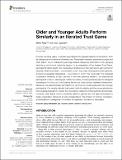Files in this item
Older and younger adults perform similarly in an iterated trust game
Item metadata
| dc.contributor.author | Telga, Maïka | |
| dc.contributor.author | Lupiáñez, Juan | |
| dc.date.accessioned | 2021-11-04T17:30:14Z | |
| dc.date.available | 2021-11-04T17:30:14Z | |
| dc.date.issued | 2021-10-12 | |
| dc.identifier | 276566569 | |
| dc.identifier | 21e1285a-a11a-46e7-a6af-a3f638e1a9c8 | |
| dc.identifier | 85117966963 | |
| dc.identifier | 000713249000001 | |
| dc.identifier.citation | Telga , M & Lupiáñez , J 2021 , ' Older and younger adults perform similarly in an iterated trust game ' , Frontiers in Psychology , vol. 12 , 747187 . https://doi.org/10.3389/fpsyg.2021.747187 | en |
| dc.identifier.issn | 1664-1078 | |
| dc.identifier.other | RIS: urn:8979A489323AD265250DBD1571AFB078 | |
| dc.identifier.other | ORCID: /0000-0002-6792-0093/work/102726022 | |
| dc.identifier.uri | https://hdl.handle.net/10023/24262 | |
| dc.description | Funding: This work was supported by the Spanish Ministry of Education, Culture and Sports, with pre-doctoral FPU fellowship FPU14/07106 to MT, and the Spanish Ministry of Economy and Competitiveness, with research projects PSI2014-52764-P and PSI2017-84926-P to JL. | en |
| dc.description.abstract | In social contexts, aging is typically associated with a greater reliance on heuristics, such as categorical information and stereotypes. The present research examines younger and older adults' use of individuating and age-based categorical information when gauging whether or not to trust unfamiliar targets. In an adaptation of the iterated Trust Game, participants had to predict the cooperative tendencies of their partners to earn economic rewards in first encounters - in a context in which they knew nothing about their partners, and across repeated interactions - in a context in which they could learn the individual cooperative tendency of each partner. In line with previous research, we expected all participants to rely on stereotypes in first encounters, and progressively learn to disregard stereotypes to focus on individuating behavioral cues across repeated interactions. Moreover, we expected older participants to rely more on social categories than younger participants. Our results indicate that overall, both the elderly and the young adopted an individuating approach to predict the cooperative behaviors of their partners across trials. However, older adults more consistently relied on gender (but not age) stereotypes to make cooperation decisions at zero acquaintance. The impact of context, motivation, and relevance of categorical information in impression formation is discussed. | |
| dc.format.extent | 13 | |
| dc.format.extent | 1612281 | |
| dc.language.iso | eng | |
| dc.relation.ispartof | Frontiers in Psychology | en |
| dc.subject | Age categories | en |
| dc.subject | Aging | en |
| dc.subject | Gender categories | en |
| dc.subject | Individuation | en |
| dc.subject | Learning | en |
| dc.subject | Trust | en |
| dc.subject | BF Psychology | en |
| dc.subject | DAS | en |
| dc.subject | MCC | en |
| dc.subject.lcc | BF | en |
| dc.title | Older and younger adults perform similarly in an iterated trust game | en |
| dc.type | Journal article | en |
| dc.contributor.institution | University of St Andrews. School of Management | en |
| dc.identifier.doi | 10.3389/fpsyg.2021.747187 | |
| dc.description.status | Peer reviewed | en |
This item appears in the following Collection(s)
Items in the St Andrews Research Repository are protected by copyright, with all rights reserved, unless otherwise indicated.

